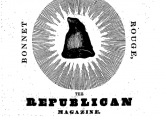After the 1830 revolution, French workers waited for the introduction of the republic into the heart of production. It never came. The struggle that ensued was to shape French politics during the Second Republic and after as republicans sought to reconcile work with the principle of non-domination.
Part one of a two-part piece on the history of republicanism and work.
In the republican tradition, work has not always enjoyed a very good reputation. Classical thinking relegated the economy to the domestic sphere, where man’s accomplishments as man did not have a place. The individual’s character as a citizen depended on interventions in the popular assembly or even military action to defend the city-state in its hour of danger. The opposition between the republic and work was inscribed into an elitist vision of the republic in which the radically non-inclusive category of citizenship left out foreigners, women, workers and slaves [1].
Moreover, this opposition was not unique to antiquity. It reemerged in the moment when political economy first arose as a political language (as a new discourse that aimed to be a substitute for traditional representations of the distribution of power) in the 18th century [2]. As Jessica Kimpell has charted in her earlier article in this debate, this was the period of tension between virtue and commerce, between republican language and political economic language [3]. There was, over the course of the 18th century, a growing chasm between the new economic activities characteristic of commercial societies and the traditional values espoused by republicanism. The characteristically modern liberal synthesis that arose privileged the protection of individuals, the promotion of their rights and the satisfaction of their needs, rather than the constitution of a community of equal citizens [4].
However, this first reading is complicated once we recognise another approach, developed on the ground by ordinary actors. The work of E.P. Thompson and, more recently, the essays of Christopher Lasch, show that in the 19th-century artisanal milieu – a universe essentially focused on work and production – there was an infusion of radical republican discourse [5]. This perspective expressed itself not as hostility towards work as such – the position of republican antiquity – but towards work as it was structured in industrial capitalism, as a critique of wage-labour.
If the key idea of republicanism consists in a definition of liberty as non-domination, then to integrate work into the republican story we must identify the forms of domination it involves. We can distinguish at least three principal forms of work-related domination:
Personal domination: linked to the placing of production into a hierarchy and the consequent subordination of workers to entrepreneurs, leaders, teachers, etc.; in short, work as subjection to the arbitrary exercise of power by other individuals.
Impersonal domination: linked to the very nature of work in nascent industrial capitalism, an unprecedented domination of work over time due to the fact that value, in the capitalist regime, is established on the basis of abstract social labour.
Inversion of values: a perception that the modern world has developed to the point of making work the dominant social activity, belittling other modes of self-experience. Work imposes itself as the primary social value.
Let us now explore how republican thinkers in 19th-century France thought about work in the light of concerns around these ‘dominations’. In Part 2 of this article we will then look at how contemporary republican political theory has responded to the challenge of work.
1830-1848: the moral republic of workers
We can begin with the 1830 revolution which saw the restored Bourbon monarchy replaced by the ‘citizen king’, Louis Philippe: the July Monarchy (1830-48).
As Jacques Rancière suggests in Proletarian Nights, workers perceived this revolution as a hint of a world about to disappear [6]. They waited for the introduction of the republic in the workshop, the establishment of a ‘moral republic’. If the workers worked all day, they nevertheless didn’t identify exclusively with their work. They wanted to gain control over their own time and, through this control, generate the inspiration that would make their difficulties tolerable. This description is not far from what E.P. Thompson, over a century later, described in his essay, ‘Time, Work-Discipline, and Industrial Capitalism’ [7]. In this essay, Thompson demonstrates the degree to which the resistance to the new industrial temporalities was strong in the first half of the 19th century in England and elsewhere in Europe, notably in France. The rejection of the domination of work over existence itself is a trait shared on both sides of the Channel.
The workers’ ‘association’ is thought of here as a place of rediscovered control, not only over the work produced, but also over time and sociability. Work becomes a place of life, rather than being simply reduced for the worker to a place of work sans phrase, as Marx would say [8]. Thus, Rancière notes that the re-appropriation of the production process by the worker does not figure “in the relationship between his instruments and his product (instruments that are his at the master’s as much as [in the association]), but rather in the reversal of his relationship with time” [9]. This reversal also translates to the refusal to be guided solely by demands internal to the process of production. Rancière gives the example of the piano makers, united in an association of which the primary benefit (far from being transformed into capital), leads to a banquet, “a fraternal meal that assembles women and children”. Thus, as Rancière comments, “the moral Republic of workers is not exactly synonymous with the reign of productive work” [10].
Let’s turn now to the revolution of 1848, which established the short-lived Second Republic (1848-52).
At the time of the Revolution of 1848, the debates showed an eagerness to establish a ‘social republic’. Alexander Ledru-Rollin, a politician and a leader of the radical democrats within the petty bourgeoisie, developed his formula of an ‘applied Republic’ at this time. This can be read as a republic ‘replicated’ within the heart of production [11]. The emergence of the ‘associative’ or co-operative form of production (the history of which continues at least as far as Charles Gide, the economist and indefatigable militant co-operator under the Third Republic of 1875-1945) was understood as the integration of work into the operation of the republic [12].
The ‘right to work’ was a key demand, prompting the provisional revolutionary government to establish National Workshops. Conceived by their more radical proponents as a step towards the ideal of workers’ productive associations, they quickly became simply a system of work-tested welfare for the unemployed. Following elections to the Constituent Assembly in April, in which the radical republicans fared poorly, the government moved to abolish the National Workshops, prompting the unsuccessful ‘June Days’ rebellion against the new, Second Republic.
For the partisans of the republic as a purely or primarily political regime, the sacrifice of the social aspects of the February Revolution seemed the lesser evil. Moreover, many republicans were convinced that the Republic did not have to apply directly to all social activities anyway, but should be embodied simply in the major political institutions. This had been the focus of their political engagement against the July Monarchy in the 1840s during the ‘campagne des banquets’. The victory of Louis-Napoleon Bonaparte in the first presidential election with universal male suffrage, the imperial impulse of the Bonapartist government, and, finally, the overthrow of the Second Republic following Louis-Napoleon’s coup d’état in 1851, did not fail to raise doubts and questions.
Republican debate in the public sphere was constituted by an opposition between a social republicanism, seeking direct application of republican principles in the economic sphere, and a republicanism that sought to restrict these principles to the political sphere. Not only did this opposition shape the history of the Second Republic between February and June 1848, but it continued latently under the Second Empire (1852-70) established by Louis-Napoleon’s coup [13].
After 1848: Are worker co-operatives the way forward?
A good indicator of the adaptation of republican thought to the question of work is given by Etienne Vacherot’s treatment of it in his celebrated 1859 work, Democracy. This book was written in the 1850s while the failure of 1848 was still present in everyone’s minds. At the time of writing, the very term ‘republic’ was banned from public discourse. It presents itself, in a barely veiled way, as a call to renew the republican ideal against the authoritarian impulse of the Second Empire [14].
The programme of democracy mentioned at the beginning of the book is an indicator of the overall work of redefining the term ‘democracy’ (a popular endeavour in the Second Empire), and of the manifest necessity of including an economic dimension: “In the economic order”, Vacherot affirms, “[democracy] replaces wage labour and patronage with free association wherever possible. In a word, it wants liberty in all its forms, for all societal conditions.” [15]
Excluding the forms of domination that persist in a wage-earning society does not imply only a protective intervention by the state. It also implies promotion of the economic conditions of autonomy that lead to the democratisation of property via the ‘association’ or co-operative [16]:
In sum, except for the exceptional case of public officials, we can say that the conditions of independence for the different classes of society can be subsumed under a single one, property […]. Work is only free in property; the worker is only independent with property. All other labour regimes are patronage regimes, more or less liberal, more or less malleable, in which real democracy cannot be accommodated [17].
The workers’ co-operative is significant for Vacherot in at least three ways. First, it is the classic condition of access to citizenship because it endows its members with the status of property-owners. Second, however, it contrasts with individualised peasant proprietorship which Vacherot sees as isolating the property-holder; it involves an education in democracy insofar as property is subject to collective decisions within the co-op. Third, the association is compatible with the most recent developments in economic activity. It is modern.
It is because of these features that it is the answer to the question that Vacherot posed: “What organisation of work would satisfy ‘the democratic principle’?” One phrase summarises the democratisation of work that Vacherot calls for: “work for oneself by working for all” [18]. Vacherot thus reverses the definition of the liberty of work that we find amongst economists, according to which it is by working for the self first that one works for all:
An associational regime substituted for the patronage [i.e., capitalist] regime would be immense progress in terms of dignity, liberty and democracy. A workshop in which each person depends on everyone, in which the only master is society itself; in which all authority is elective, all managerial direction removable; in which all personal commands are only the voice of regulation freely-chosen between all of the members of society; in which all workers are owners, and work for themselves in working for all […] what a beautiful sight compared to the servitude of our actual workshops! It is democracy realised in industry [19].
Nevertheless, some republicans questioned this position. Another view, put forward by the republican and banker Henri Cernuschi, held that capitalist wage-labour is consistent with republican values provided that certain conditions are satisfied. At the same time, Cernuschi expressed scepticism towards the co-operative model advanced by the majority of republicans in the 1850s and1860s such as Vacherot. In his 1866 book, Illusions of Co-operatives [20], Cernuschi argues that the only consistent trait one can recognise in co-operatives is that they are usually endowed with little capital. Therefore, a legal framework must be created that allows them to increase their capital without difficulty. They must be able to welcome new associates, and the number of property titles must expand even if only supported by weak contributions
But such a formula, according to him, brings with it an important social risk for the worker: that of losing the little capital that he was able to save, capital that would be swallowed up in the co-operative structure. It is no longer the classic republican theme of master and slave – recurrent in Vacherot’s work – that is mobilised here, but instead, the classic republican concern with ‘Fortuna’, the hazards of life against which the republic conventionally serves as a defence.
In short, the co-operative model does a disservice to workers. Cernuschi’s position exemplifies a form of republicanism that is actually pessimistic about our being able to directly apply republican principles in all social spheres. This does not rule out, however, a protective, regulatory role for the republican state where the direct application of republican principles is undesirable.
The Second Empire fell in 1870 as a result the Franco-Prussian War. Under the Third Republic which followed (1875-1945), republicanism of the kind represented by Vacherot, which seeks to bring democratic principles directly into the economic sphere, became increasingly marginalised. Or else it was simplistically conflated with the communist project.
It is only in recent years that we have begun to see a revival of this kind of republican perspective. In Part 2 of this article we will explore how it has reemerged in contemporary political theory [21].
Vincent Bourdeau is a Lecturer in political philosophy at the University of Franche-Comté and a member of the Research Unit Logics of Action (E.A. 2274).
This post is based on a longer article originally published in French at Implications Philosophiques. It is translated from the French by Nadia Hilliard.
This post is part of the Democratic Wealth series, hosted by Politics in Spires in partnership with OurKingdom.
Notes:
[1] On this question, see: Pettit P. ‘Preface’ in V. Bourdeau and R. Merrill (eds.), La république et ses démons. Essais de républicanisme appliqué, Paris, éditions è®e, 2007, p.7 and the following pages. And more generally: Pettit P., Republicanism : A Theory of Freedom and Government, Oxford, Oxford University Press, in particular Chapter 1.
[2] Hont I. & Ignatieff M., Wealth and Virtue : the Shaping of Political Economy in the Scottish Enlightenment, Cambridge, Cambridge University Press, 1982.
[3] Pocock J.G.A., Virtue, Commerce, and History, Cambridge, Cambridge University Press, 1985.
[4] Scottish social thought, and Adam Smith’s political economy in particular, thus appear as: ‘…a theory of a pluralisation of human personality […] presented as an ideological alternative to the classical ideal of the personality unified by civic virtue and by a relatively static economy.’ See J. Pocock, ‘Cambridge Paradigms and Scotch Philosophers : a Study of the Relations between the Civic Humanist and the Jurisprudential Interpretation of Eighteenth-Century Social Thought’, in Hont I. & Ignatieff M. (eds.), Wealth &Virtue, op. cit., p.245. See also: Spitz J.-F., La liberté politique. Essai de généalogie conceptuelle, Paris, Presses Universitaires de France, 1995.
[5] Thompson E.P., The Making of the English Working Class, London, Victor Gollancz, 1963; Lasch, Christopher, The True and Only Heaven : Progress and its Critics, New York, Norton, 1991. [6] See in particular Chapter 2, ‘La porte du paradis’, in J. Rancière, La Nuit des prolétaires. Archives du rêve ouvrier, Paris, Hachette/ Pluriel, 1997, pp.36-60 [See : Proletarian Nights : The Worker’s Dream in Nineteenth-Century France, London, Verso, 2012 (Second Edition)].
[7] See Thompson E.P., ‘Time, Work-Discipline, and Industrial Capitalism’, Past and Present 38 (1), 1967, pp.56-97.
[8] ‘The abstract category ‘labour,’ ‘labour as such,’ labour sans phrase, the point of departure of modern economics, thus becomes a practical fact only there [in the USA as the most modern form of bourgeois society].’ See Marx K., ‘Introduction to a Critique of Political Economy’, appendix to Marx, K., translated by S.W. Ryazanskaya, A Contribution to a Critique of Political Economy, London, Lawrence and Wishart, 1971, p.210 ; also available at http://www.marxists.org/archive/marx/works/1859/critique-pol-economy/appx1.htm.
[9] Idem, p.89.
[10] Ibid., pp.328-9.
[11] Ledru-Rollin, ‘discourse on the debate over the labour law in the Assembly in 1848’, in J. Garnier (éd.), Le droit au travail à l’Assemblée, recueil de tous les discours prononcés dans cette mémorable discussion, Paris, Guillaumin, 1848, p. 123.
[12] The two terms have similar usage but are offset in time: ‘association’ is a term in use until 1848, but ‘co-operative’ takes over beginning in the debates in the Second Empire. It allows its proponents to avoid confusion with the term ‘association’, discredited partly by the National Workshops in 1848.
[13] See Agulhon, M., translated by J. Lloyd, The Republican Experiment : 1848-52, Cambridge, Cambridge University Press, 1983 [1973]. The history of 1848, according to M. Agulhon, is structured by the opposition between two versions of the Republic: February 1848 and June 1848. This historical tension is constitutive of two republican models that, according to him, still shape our political modernity: a political model and another, more social model.
[14] This won its author both condemnation and imprisonment. On the context of the release, the trial, and the importance of the work for republicans, see: Sudhir Hazareesingh, ‘The Ambiguous Republicanism of Étienne Vacherot’, Intellectual Founders of the Republic: Five Studies in Nineteenth-Century French Republican Political Thought, Oxford, Oxford University Press, 2001, pp.129-65.
[15] Vacherot E., La Démocratie, Chamerot, 1859-60, p. XVII.
[16] Idem, p.151.
[17] The verb ‘to democratise’ made its appearance precisely in these years; Vacherot uses it in La démocratie, taking care to excuse the neologism: ‘it is possible to democratise (if we excuse the barbarism)’, Ibid., p.272.
[18] Ibid., p. 183.
[19] Ibid.
[20] Cernuschi H., Illusions des sociétés coopératives, Paris, Librairie internationale A. Lacroix, Verboeckhoven et Cie, Guillaumin, 1866.
[21] This first synthesis is an example of a field of study that is in the process of developing, dating from 2006. See Politics, Philosophy & Economics, June 2006, Vol. 5, N°2, including Dagger, R., ‘Neorepublicanism and the Civic Economy’, pp.151-173.


![DWlogo3-194px[1]](http://politicsinspires.org/wp-content/uploads/2013/01/DWlogo3-194px1.png)






No Comment